This blog post is especially for students that a) didn’t do well in their P4/P5 EOY exams, b) not improve much despite attending enrichment/tuition, or c) forgot words very quickly.
Is it possible to improve grades from P5 EOY to PSLE?
A common question we see is whether it’s possible for students to improve their scores from the P5 EOY Chinese exam to the PSLE.
Over the last 10+ years, we have helped thousands of students excel in Chinese. From experience, P5 scores don’t matter that much. How a child scores in PSLE depends way more on what he does in the next 11 months.
For instance, we helped a child improve from AL6 in P5 to AL2 in P6.
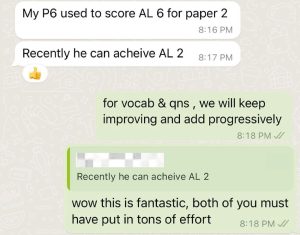
What should I take away from the EOY Chinese exams?
Context: students generally experience a dip in grades in P5 compared to P4. This is due to a combination of a heavier wordload, stricter marking, and higher expectations. As students get used to the new requirements, their scores are likely to rise.
Thus, treat the EOY exams as a snapshot of what we need to improve while recognising there is time to make substantial improvements.
In general, we recommend first focusing on the low hanging fruits by maximising your score in Listening, MCQ, and Oral first. For instance, if you are scoring 14 and below for listening, you definitely want to shore up that area since that’s the easiest section in PSLE.
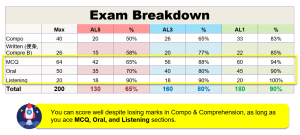
But before going further, let’s address the following.
Why is my child not improving despite enrichment/tuition?
We have been running Chinese enrichment for more than 10 years, and the single biggest problem students face is a weak foundation due to accumulated knowledge gaps from previous levels.
Weekly enrichment or tuition often only have time to cover materials from your current level, and the assumption is students will revise previous content on their own. However, for the vast majority of students, this is unrealistic.
Consider the following image – notice how a typical P6 sentence only has 1-2 words from P6 and everything else is from previous levels. So if a child has been struggling with Chinese over the last few years, unless you go back and rebuild the foundation from the ground up, tuition or enrichment progress is likely to be slow.
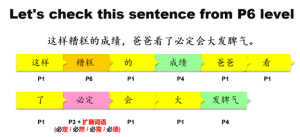
The good news: you can do something about it over the school holidays.
Why the Nov/Dec Holidays Are Essential for Rebuilding
According to a 2019 study by the National Institute of Education, Singaporean students experience an average loss of 2.5 weeks of academic progress during the school break.
Typically, students have to spend the few weeks of the new year catching up on what was forgotten. But P6 students don’t have that luxury – the moment school starts, the next 9 months are jam-packed with exam preparation, enrichment/tuition, and homework.
That’s why if your child didn’t do well during the EOY exams, the holiday break is the best time to rebuild fundamentals. Just 30 mins a day, and it’s probably the best investment you can make.
For instance, we previously wrote about a P6 child who improved by 20 marks in 4 months using our approach.
The Three-step Method to Rebuild Your Child’s Foundation
Our approach is based on Bloom’s Mastery Learning Model and Spaced Repetition.
Under Bloom’s learning model, students must achieve mastery in a chapter before moving on to the next chapter. If not, he needs to revise and be retested until mastery is achieved.
For students with weaker foundations, we start rebuilding the vocab foundation from the lower primary. Start by choosing a level based on how your child did for the EOY paper (rough gauge below).
Table for P5 Child
| EOY exam score | Starting Level |
| <= 50+ marks | P1 |
| 60+ marks | P2 |
| 70+ marks | P3 |
| >= 80 marks | P4-5 |
Next, begin from the first chapter of the starting level. You want to achieve mastery for each chapter before moving to the next. Once you are done with all the chapters in the level, you move to the next level (e.g. P1→P2→P3→P4→P5). Typically, your child will spend 1-2 weeks per level – and the goal is to complete P1-P5 revision by the new school year.
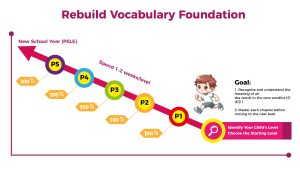
How do you track mastery?
For each chapter, you want to be able to recognise and understand the meaning of all the words in the core wordlist (识读字). For instance, given the word 照顾, you need to be able to pronounce and know it means “to look after”.
Many students stop here but this is not enough as a common problem is knowing the meaning of a word, but not understanding when used in a sentence or paragraph.
At VocabKing, we encourage students to further their understanding by reading aloud simple sentences utilising the vocab (e.g. 妈妈每天都照顾我。).
This has three benefits:
Firstly, research shows reading aloud helps students remember the word better due to the production effect.
Secondly, this helps students practise oral (25% of PSLE score).
Lastly, this helps students understand how the vocab is used in a sentence and develop a feel for the language (语感).
At the same time, we know most students refuse to speak Chinese at home. However, we found that when you make speaking a fun game (e.g. in our fishing game, the better you speak, the more fishes you capture), students are happy to speak up. Indeed, from Jan-Oct 2024, our students have spoken nearly 190k sentences!
FAQ
1. My child is P5 and failed his EOY exams. Is starting from P1 really necessary?
While this might seem like an overkill, this is the best way to improve for students scoring 50+ and below and it doesn’t take very long since it’s quite fast to complete P1 and P2.
AL6 bands are extremely wide (45-64), and it’s not very useful to aim for a few marks improvement from memorising a compo opening, etc. To improve to AL5 and better, your child needs to dramatically improve by rebuilding foundation.
In addition, as this testimonial shows, weaker students benefit from rebuilding their confidence by mastering easy materials, which pays dividends in terms of motivation toward learning Chinese.
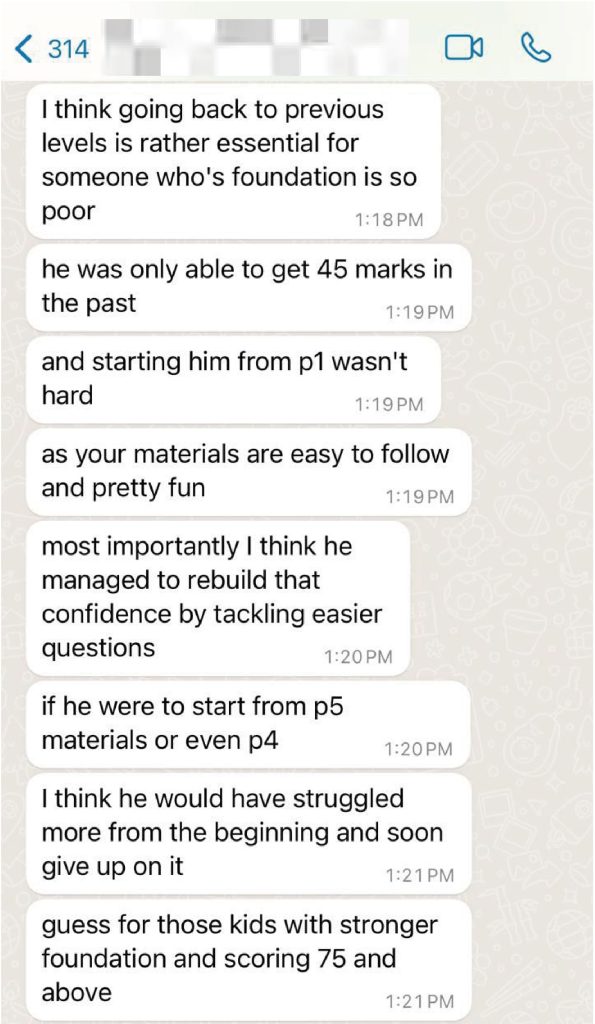
2. Is VocabKing a replacement for tuition/enrichment? Do I still need it if I have tuition?
VocabKing is not a replacement for tuition/enrichment but is an essential language supplement.
While tuition and enrichment are important, they have trouble covering oral practice and vocab gaps from previous years due to lack of time and/or large class sizes.
VocabKing complements your tuition/enrichment classes through 10-15mins of daily speaking, vocab & paper 2 exercises.
Ready to Strengthen Your Child’s Chinese Foundation?
Let us help! Start with a free analysis of your child’s End-of-Year Chinese Exam results, where we’ll provide personalized recommendations on the ideal starting level for rebuilding a strong foundation. Plus, enjoy a free trial of VocabKing’s engaging tools to kickstart their holiday learning journey. Don’t miss out—slots are limited! Book your free analysis and trial today to help your child make real progress this holiday season!
Contact us at +65 9820 7272 for more information.
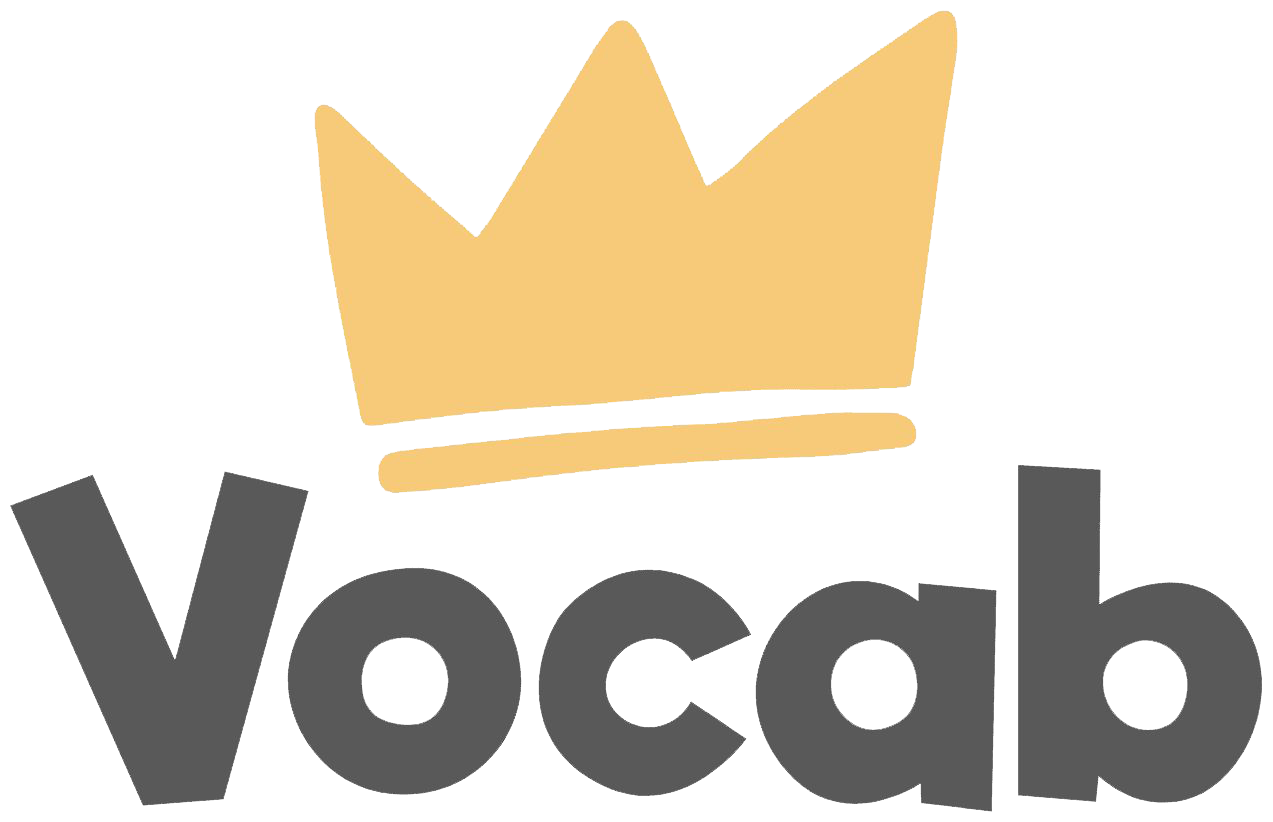

No responses yet